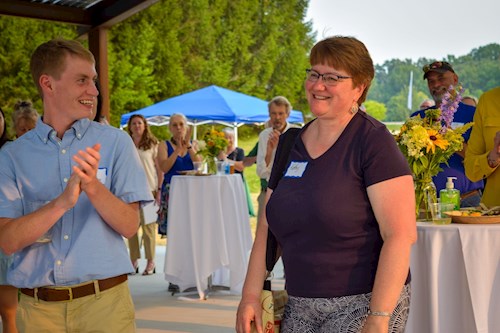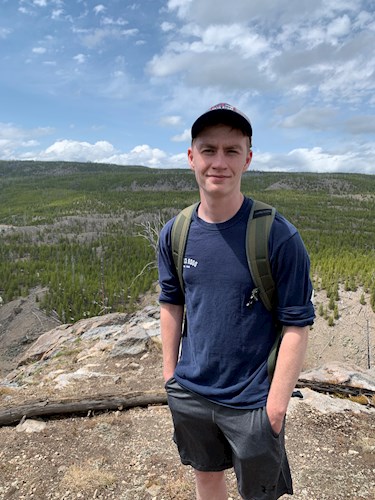

Andrew Ericson
It’s been a pleasure to serve as a Climate Action Intern for these past three months. As a lifelong resident of Dane County, the work I’ve done has felt additionally rewarding as I am actively able to help the community that I call home transition towards a climate friendly future.
My passion and drive to respond to the climate crisis started when I was in 2nd grade at Van Hise Elementary School. My teacher, Mr. Christopherson, led our class to create an original song called “Pollution Solution” which we subsequently performed at Monona Terrace during an Earth Day celebration. The process of creating that song meant I was exposed to the science behind climate change at a young age; the science terrified me. That early experience drove me to devote much of my time to work on solutions for climate related issues. When the opportunity to work for the OECC presented itself, I had to jump on it.
Over these past 3 months I’ve been able to assist the OECC by continuing work on various preexisting projects while also taking on and creating some of my own. In the beginning, I was working on the OECC’s Clean Energy Map and Climate Champions Program. Both projects required cold calling local businesses, non-profits, faith-based organizations and more. For some people, that may sound like the last thing that they want to do. My generation isn’t too keen about talking on the phone, but personally, I had a blast. Being able to share the excitement over the recent installation of solar panels and learning from locals about the current actions being taken in the community to combat climate change put a smile on my face. There is no better feeling than sharing your passions with others in pursuit of creating a better future. While the conversations themselves were great, it was the thought of progress being made in our community that reassured and motivated me.
This past summer, the majority of my work was focused on analyzing and understanding neighborhood covenants. The goal was to compile the information I uncovered into a comprehensive map intended to be accessible for those who are unfamiliar with the restrictions homeowners may have on their property. A local relator came to Kathy Kuntz at the beginning of the year and illuminated the world of restrictions on solar and wind in neighborhood covenants. From the get-go, I knew this was the project for me. My initial methods of data collection included finding neighborhood websites, sending emails to the “Presidents” of HOAs (which were often not up to date), and reading pdfs entitled “Downstairs Copy Machine”. This method proved itself ineffective and slow moving, yet it was through this grueling process that I was introduced to the Register of Deeds Index. This changed everything. The Register of Deeds Index contained a list of every single plat in Dane County and its attached covenant, if one existed. I had found the treasure chest… the only problem was there were 7,500 plats to tackle in Dane County. Daunting, to say the least. Thankfully, Kathy came to the rescue by bringing in the Zoning and Planning Department as collaborators. Together we devised an efficient data collection strategy which included excel sheets and color coordination…it is gorgeous.
In total, the data collection process took a bit over a month. The powers of coffee, podcasts and music willed me through the generally mind-numbing process of moving from PDF to PDF. At times it felt endless. Still, inspiration found ways to strike me sporadically as I sat at my bedroom desk and enabled me to knock out the next 100 covenant entries. I believe that those waves of inspiration came from my inner fire and passion for sustainability. The widespread language that disincentives the installation of solar or wind, or the flat-out prohibition of solar panels in neighborhoods only fanned my inner fire and drove me to continue the work with newfound determination. The other force that propelled me forward was the thought of the possibilities that would arise from the conclusion of the research; the potential for significant increase in the number of homeowners who would install solar or wind. Though the work was grueling at times, I understood the significance of my contributions. I wanted to do this, and I wanted to finish it. (For folks new to this issue, I should clarify that Wisconsin has several laws that protect a resident’s right to install solar or wind energy systems; covenants should not prohibit renewable energy installations.)
Somewhere in the middle of this research, I came across the first of what would be multiple “Racial Covenants”. These covenants had language along the lines of, “Only members of the Caucasian race shall use or occupy any dwelling on said plat excepting that this covenant shall not prevent occupancy by domestic servants of a different race employed by an owner or tenant.” The first few were shocking, but as I began to process them, each encounter became less and less surprising. Racism is tightly woven throughout the United States and its history. Dane County is no exception. I relayed these racial covenants back to the Zoning and Planning Department where there is an active initiative that tracks down and makes note of these historic racial covenants. Neighborhoods with covenants that include race restrictions are spread across the county, you may even live in or near one of them. Through my research, I learned that the covenant for the neighborhood adjacent to where I live includes the exact type of racially driven language as above. Even though it is void, that language can still be found with a quick search on the Register of Deeds website. While covenants may not be at the forefront of prospective homeowner’s minds, it is crucial to acknowledge how these covenants, and the language used within in them, have shaped the communities and neighborhoods we see today in Dane County.
Researching solar and wind restrictions and learning of their proximity to racial restrictions sparked an internal dialogue about the overlap between my research and equity. The research I’ve done aims to help educate homeowners and boost the homes that can produce their own sustainable electricity. What it fails to address is the large percentage of people who don’t own homes or have the capital to make an upfront investment. Simultaneously, when looking at those who do own homes, there are clear disparities between homeownership across racial identity. Ultimately, my work will help some but is not all inclusive.
Equity was a major theme throughout the office meetings held by Kathy with the fellow office staff/interns (Mingxin, James, Alyssa). Within our group there was a significant inclination to discuss the issues of equity in the transition to a sustainable society. Concepts like community solar, electric vehicle car shares and residential tree cover were core discussion points during our group meetings. I’m encouraged in knowing that equity is an integral part of the Dane County Climate Action Plan. However, its inclusion doesn’t mean that the problems of equity in sustainability will be fixed automatically. As I enter my last year of undergraduate and look beyond, I see a high likelihood that I will enter the realm of sustainability. I’m excited to take on the challenge of ensuring that the clean energy transition is an equitable one.
If you are interested in speaking with me about the work I’ve done with OECC or at UW La Crosse, feel free to reach out to me on LinkedIn.

Andrew is a forth year student at UW - La Crosse studying Chemistry: Environmental Science. At UWL, he is involved in various sustainability efforts including: serving as the Green Fund Coordinator, and Co-Chair of the Joint Committee on Environmental Sustainability, he also represents the College of Science and Health as a Student Senator.
The Dane County Office of Energy & Climate Change maintains this blog as a way to offer:
To be sure that you don't miss new blog entries, subscribe to our email updates.
And learn more about internship opportunities on our About Us page.